- Home
- Tad Williams
Sleeping Late on Judgement Day Page 2
Sleeping Late on Judgement Day Read online
Page 2
But there had been something different this time—something deeper that I couldn’t grasp, almost as though she had truly been trying to communicate with me. But how, why, or about what, I had no clue.
I found my boxy old Datsun at last, down an alley off Heller Street that I only barely remembered choosing. It was late November but dry and clear, so traffic wasn’t too bad even this close to downtown; it took me less than a quarter of an hour to reach the accident scene, just a little way south of the Woodside Expressway cloverleaf. Some kind of minivan with writing on its side lay upside down and badly damaged at the end of a trail of wreckage. Black and whites and emergency vehicles had parked all over the shoulder, lights whipping blue and red. The only body was on the ground, covered with a bloody sheet, and nobody looked like they were in much of a hurry.
Angel time.
I left my car on the shoulder about a hundred feet past the accident and walked back through the ice plants. None of the cops gave me a second look as I approached, but that’s pretty much how it is: when angels are working, especially at a death scene, we just don’t get noticed. Of course, the cops and paramedics were going to see even less of me in a second. When I was within a few yards of the body, I stopped and opened the portal of bright but unsteady light we angels call a Zipper.
Yes, that’s what we call them. Spare me the crude jokes, because believe me, I’ve heard them all, mostly from other angels. The Zippers are just an opening we go through to do our work. They’re holes in Time, and everything on the other side of them is kind of a bubble made of that single moment.
The sounds of the freeway died as I stepped through. On the other side, the emergency vehicles and the passing cars, and even the people, had all frozen into place as if a billion gallons of clear plastic had been poured over everything—cops halted in mid-gesture, lights frozen at different stages of illumination, an entire universe gone silent as a tomb. Other than me, the only thing moving was a guy in work clothes walking in and out among the motionless cars, pounding on windows, trying to get one of the drivers to notice him. They wouldn’t, of course, because he was outside of Time and they were all still inside it.
He saw me coming and ran toward me. He had a thick mustache and dark skin, but all I could really focus on were the terrified whites of his eyes. “Help me!” he shouted. “I have had an accident!”
“Gurdeep Malhotra,” I said. “God loves you.”
“Who are you?” he asked, stumbling to a stop.
“I’m Doloriel, your angelic advocate.” I gave him a moment for that to sink in. “I’m afraid you didn’t survive your accident.”
He stared. If blood had still been flowing in his veins, I’d have said he went pale. As it was, he seemed to lose resolution for a moment as the shock washed through him. “But . . . but I can’t! My son! It’s his . . .” He shook his head slowly. “My wife! Will I never see her again?”
“There’s a lot I can’t tell you,” I said as kindly as I could. In fact, there’s a whole lot I don’t know myself. “But first we have to prepare you for judgement. That’s my job. I will do everything I can to defend you. I know you were a good man.” (I didn’t really know that yet, but it never hurts to calm a client down so you can work with them.)
He was still staring at me. “But you . . . you are an angel? How can this be? I am not a Christian!”
“That’s okay, Mr. Malhotra. I’m not a Christian angel. I’m just an angel.”
• • •
The judgement didn’t go as fast as I would have liked. The prosecuting demon was a little upstart named Ratpiddle, the sort who thinks he’s going to win every case with some amazing Perry Mason move. He dragged out every transgression the poor dead guy had ever made—a reckless driving where the officer hadn’t even ticketed him!—and tried to create a picture of a life of unconcern for others, despite the fact that this morning Gurdeep had only been hurrying because he wanted to wrap his son’s birthday presents before the kid got up for school. That got to me, and I’m afraid I referred to the prosecutor as, “scum scraped from the restroom floors of Hell,” which, although reasonably accurate, was not strictly collegial. Anyway, luckily for me and Mr. Malhotra, the judge was a stolid ball of radiance named Sashimiel whom I’d argued in front of dozens of times; she wasn’t prone to getting excited because some prosecutor was trying to make a reputation. After a decent interval she simply cut Ratpiddle off in the middle of some new detour and declared judgement in favor of my client. Whoosh! Gurdeep Malhotra was off to whatever happens next. (Despite the fact that the same thing must have happened to me, too, I don’t remember any of it, so I’m afraid I can’t fill in the blanks.) The judge poofed back to wherever Powers and Principalities go between judgements, Ratpiddle disappeared in a smoking snit, and I was free to get on with my day.
two
old friends, new fiends
WHEN I got back to the so-called real world from the timelessness of Outside, it was a bit before nine in the morning. See, just because we step outside it doesn’t mean Time actually stops. I think it’s something to do with us earthbound angels wearing mortal bodies. As soon as we step back through the Zipper we catch up with the difference between Outside and the real world—in this case, a couple of hours or so. I’m not really a morning guy, but the thought of crawling back into bed to dream about Caz again depressed me, so I headed across the waterfront to Oyster Bill’s, a bar that serves food, sort of. I have a soft spot for the place, and I’ve been going there as long as I can remember, which I suppose proves I have more loyalty than sense. In fact, if I weren’t already dead, that could be my epitaph.
• • •
I was polishing off the last of the starch-and-grease mélange Bill mischievously refers to as “breakfast” when an old rummy wandered in from the street and started making his way down the counter, discreetly panhandling (because Bill doesn’t like begging in his bar—he thinks it lowers the tone of the joint, which is about the cutest thing I’ve ever heard). Most of the other customers didn’t talk to the guy or even acknowledge him, waiting until he got the point and walked away, but when he reached me I fished in my pocket for some loose bills. The old fellow had rheumy eyes and hair that stood up like it had been fashion-moussed back in the 80s and never touched since. He also smelled like he’d been drinking something you aren’t supposed to drink—Aqua Velva, perhaps, strained through an old shirt.
I put the money in his hand and said, “Good luck. God loves you.” I didn’t say it very loudly, because being polite in Oyster Bill’s is a bit like visibly limping past a pride of hungry lions, but he seemed to hear. He smiled toothlessly and patted my shoulder.
“Thank you, friend,” he said, slurring less than I would have expected. “I’d like to give you something for your kindness.”
“No, really, you don’t need to . . .”
He reached into his pants pocket and pulled out a creased, once-white sheet of paper that had been folded like a letter. He handed it to me like it was worth something, which was another kind of sad. “Promise you’ll read it. Promise you’ll think about it. God knows you and wants you for His great plan.” Then he shuffled off and out onto the esplanade.
Okay, yes, it was a tiny bit ironic for a wino to be assuring an angel that he’s wanted for God’s great plan. I glanced at the piece of paper, but it seemed to be more political than religious. The headline was something about “Someone in the White House wants you destroyed!” I almost left it on the counter, but for all I knew the old duffer was watching me through the window from outside, thrilled someone had actually accepted one of his crumpled handbills, so I stuck it in my pocket before I headed out.
I still didn’t want to go home, but ten in the morning was way too early to go over to the Compasses and get blotto in the company of sympathetic co-workers, so I decided I’d try my buddy and co-angel Sam, who I hadn’t heard from in the last couple of days. (Sam
had inadvertently got me into most of the shit I was currently wading through, so it speaks volumes that I still considered him my bestie.)
I hate walking and talking on the phone almost as much as I hate people who walk and talk on the phone, so when I saw an empty bus bench on Parade Street—usually full of brown-bagging office workers, tourists, or those ubiquitous, slightly ratty-looking, downtown young people whose dogs always wear bandanas—I grabbed it and got out my phone. In the process the rummy’s screed (which really sounds like a horror movie now that I think of it—The Rummy’s Screed! Return of the Rummy’s Screed! Curse of the . . . okay, you get it) fell out of my pocket, so as I listened to Sam’s phone ringing on the other end I looked it over again.
There wasn’t actually a whole lot on it. At the top, in big blocky handwritten letters it said, “Someone in the White House wants to destroy you!” with a picture of the building in question floating in the clouds. Then it said, “You have enemies. Don’t you want to know about them? THEY know about YOU!” Beneath that was the mandatory bible quote found in so much of your finest crazy-person literature:
Ecclesiastes 9:12
For man also knoweth not his time: as the fishes that are taken in an evil net, and as the birds that are caught in the snare; so are the sons of men snared in an evil time, when it falleth suddenly upon them.
Down at the bottom a group of slightly odd things had been cut out of magazines and taped to the original before it was photocopied. The first two were a picture of an angel and another of a donkey. The angel bit was an interesting coincidence. I glanced at the donkey, wondering if that was meant to indicate the Democrats, the current White House occupants. Sam’s phone kept ringing. At last I hung up, but something else was bothering me now.
Then it hit me. Donkey. Mule. Archangel Temuel, my supervisor.
Two more pictures were at the bottom of the handbill, a clock out of a child’s picture book and a cartoon of a garden bench. That seemed another long coincidence, since I’d met the archangel on a bench in Beeger Square a few times in the past. And if it wasn’t a coincidence, I was being ordered to a meeting.
I trotted over to the square but saw no sign of the fragrant old man on any of the benches. Could it really have been Temuel? Our archangel liked disguises, especially when he was being secretive, and it was entirely possible he knew that everyone in my department called him “The Mule.” Also, “White House” wasn’t that different from “the Big House” and other things we angelic grunts called Heaven. But did I need a message to tell me people in Heaven were out to get me? Shit, I knew that already. Temuel knew that I knew that already. So either it was what I’d thought in the first place, a slightly coincidental piece of mail from Farthest Crazyland, or my boss had come all the way to Earth to meet me so he could warn me I was in even deeper trouble than I thought I was. And I’d missed the meeting.
I looked at the piece of paper again and this time I noticed that the hands on the clock were pointing to eleven. I checked the time on my phone. Nine-forty. No wonder there was no sign of Temuel—I still had almost an hour and a half to wait. So apparently I was going to the Compasses after all, because I sure as hell wasn’t going to sit in windy Beeger Square for all that time. Besides, I wasn’t going there to drink, just to kill time until I could find out if this was a real communication, so it didn’t really count.
How often have you held a piece of paper in your hand and prayed that it belonged to a real drunk smelling of real, rank sweat and old aftershave instead of being a message from an archangel?
First time for me.
• • •
When I got to the Compasses, the place was all but empty—just a couple of angels I didn’t know too well, French Didi and another guy, sitting in one of the booths emptying a bottle of wine between them like it was ten in the evening instead of ten in the morning. They only looked up long enough to nod, then went back to arguing about Formula One racing. Like I said, I didn’t know them, and Formula One isn’t really my thing, so I almost walked out again. I bellied up to the bar instead and asked bartender Chico to slide me a beer.
Yes, I know I said I was cutting back. See, vodka, that’s drinking. Beer—well, beer is just getting the inside of your mouth wet.
Anyway, as Chico pushed the bottle of Negra Modelo over to me, he said, “Looks like all you special cases are coming home to roost today.”
“Who else beside me?”
“What am I, your secretary? Go look in the back room.”
I figured it must be Sam, who had already made one dangerous (and as far as I could tell, completely pointless) return to the bar, where he’d been treated like a returning war hero by the rest of the Whole Sick Choir, but what he was doing in here at this hour was beyond me. The idea made me very nervous, and it wasn’t because it was so early. Because of his known involvement in the Third Way, Sam was seriously angelica non grata with our bosses in Heaven.
The back room at the Compasses is actually a little alcove on the way to the restrooms—what the Brits call a “snug.” I pushed aside the curtain and found Walter Sanders huddled over a mug of beer.
Yes, that Walter Sanders: the angel who had been stabbed by a crazy dead guy who I’d assumed was trying to stab me, just when Walter was about to tell me something important. (I now felt pretty sure Walter himself had been the target, to shut him up.) Then he had disappeared completely. The last time I’d seen Walter he’d been in Hell wearing a demon-body, working on a slave ship. The last thing he’d done had been to point a finger at Anaita, one of my most powerful angelic superiors, as the person behind the Third Way (Heaven’s currently Most Wanted rebels) and much of the rest of my recent troubles. And Hell was where I’d left Walter Sanders, too, which meant I was more than a wee bit surprised to see him sitting there in an overcoat, nursing a drink like any other Compasses regular.
“Walter!” I threw myself onto the bench across from him. “What the hell—pardon the expression—are you doing here?”
His first response had been a flinch, but when he saw it was me, he smiled. It was a tired sort of smile. “Hey, Bobby. Good to see you. I’m back.”
“Fuck, yeah! I noticed. But how? When? What happened?”
“Still not quite sure. Last I remember, you and I were walking down the street, then . . . nothing. When I got rebodied, I found out I’d been gone for weeks! Pretty strange. A little hard to . . . to get up to speed again.” He laughed unconvincingly and sipped his beer. “But it’s nice to see a familiar face.”
All the questions about to pour out of me suddenly clogged my brain like a dammed-up stream. It took me a couple of seconds to work through what he’d just said. “Hang on. You don’t remember anything? Since you were stabbed?”
He shook his head. “Not a thing. I hardly remember the night it happened, either. I just remember you were there. I hope it wasn’t too tough on you, Bobby. I know you tried to get me help.”
I could only sit, my beer untasted, and stare at him. What was going on? Had Walter been mind-wiped after being sprung from Hell? Or was he just being cagey—too smart to start blabbing in an angel bar about the kind of things that had really happened? I took a deep breath, tried to keep my hands from shaking, and made appropriate small talk while we drank our beers, although I didn’t want mine now at all. When I’d drunk about half, I put it down and announced that I had to go. I asked him if he was walking and if he wanted company, but Walter only shook his head again in that sort of dazed way.
“No,” he said. “No. I’ll be honest, Bobby. It’s my first day back and this is about all the talking I can handle today—I saw a couple of the gang already, earlier. I’m . . . I don’t know . . . tired. Really tired. I’m just going to finish this, then I’ll call a cab.”
I was feeling a little desperate. “Okay. But you’re sure there isn’t anything you want to talk to me about? Doesn’t have to be tonight. Any time i
s fine. Because you wanted to talk to me that night. You had something to tell me.”
He gave me a strange look. “There is one thing, actually. Does this mean anything?” He pulled out his wallet, fumbled for a moment, then produced a piece of folded paper. It was a leaf from an executive calendar, one of the note pages without a date, and it said, “Talk to D about A -?s”
My pulse sped a bit. “Is this your handwriting?”
“Yeah. But it’s from before the stabbing, and I don’t remember what it’s about. I just realized “D” might be you. Ring any bells?”
“Could be.” Damn straight. Talk to Dollar about Anaita asking questions, that was what it meant. “Appreciate it, Walter. I’ll give it some thought. Feel better.”
When I returned to the bar, Chico looked at the half bottle I put on the counter. “Sick?”
“A little,” I said. “Unsettled” would have been a better word. Because I knew that was all I was going to get from Walter Sanders. Whatever had made him want to talk to me on that fatal night was gone, burned out of him by the machineries of Heaven. But thanks to the note Walter had made to himself before he was taken off the board, I wasn’t going to waste any more time wondering whether I was right about that supreme bitch-angel Anaita. From now on, as far as I was concerned, she absolutely was out to get me.
Which still left me with the unpleasant fact that somebody much more powerful than me wanted me silenced, if not utterly obliterated.
As I came out of the Compasses, wishing I still smoked, something scuttled under a car at the edge of my sight. Normally I wouldn’t have paid any attention, but Walter’s return—or at least, the return of part of Walter, just not the part I needed—had me more than a little on edge, so I looked carefully. After all, if knife-wielding Smyler had come back and decided I was Bobby Bad Angel again, I didn’t want to be caught by surprise. From the split-second view I had before it vanished down a storm drain, whatever it was didn’t look much bigger than a cat, but cats didn’t run like that, legs splayed out, bellies almost on the ground.

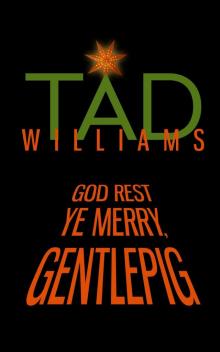 God Rest Ye Merry, Gentlepig
God Rest Ye Merry, Gentlepig Tailchaser's Song
Tailchaser's Song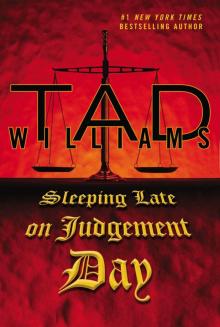 Sleeping Late on Judgement Day
Sleeping Late on Judgement Day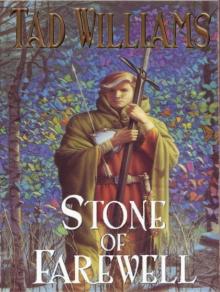 Stone of Farewell
Stone of Farewell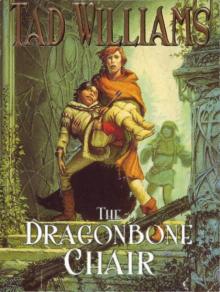 The Dragonbone Chair
The Dragonbone Chair Sea of Silver Light
Sea of Silver Light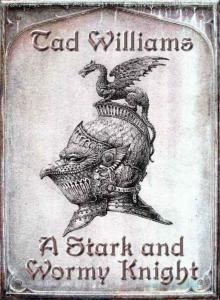 A Stark and Wormy Knight
A Stark and Wormy Knight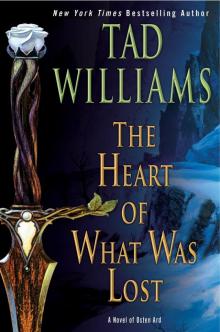 The Heart of What Was Lost
The Heart of What Was Lost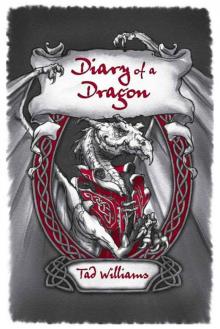 Diary of a Dragon
Diary of a Dragon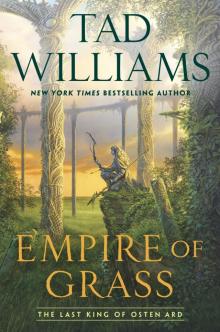 Last King of Osten Ard 02 - Empire of Grass
Last King of Osten Ard 02 - Empire of Grass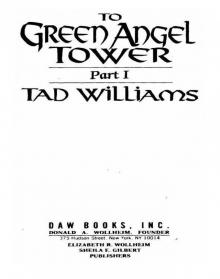 To Green Angel Tower, Volume 1
To Green Angel Tower, Volume 1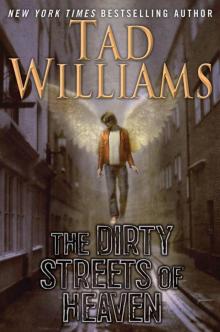 The Dirty Streets of Heaven
The Dirty Streets of Heaven River of Blue Fire
River of Blue Fire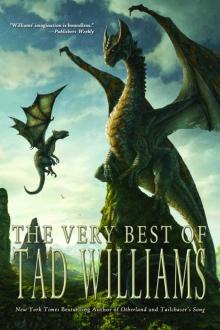 The Very Best of Tad Williams
The Very Best of Tad Williams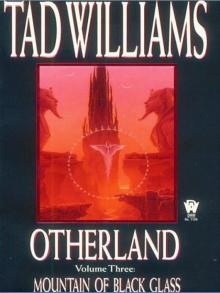 Mountain of Black Glass
Mountain of Black Glass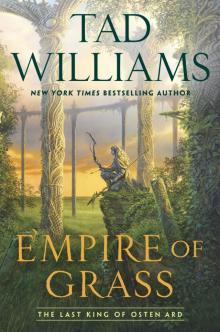 Empire of Grass
Empire of Grass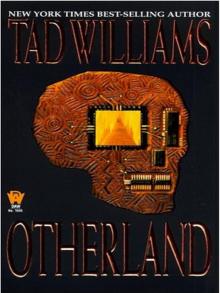 City of Golden Shadow
City of Golden Shadow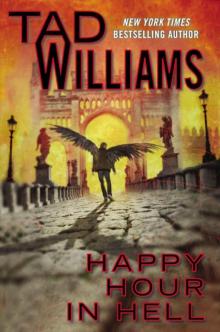 Happy Hour in Hell
Happy Hour in Hell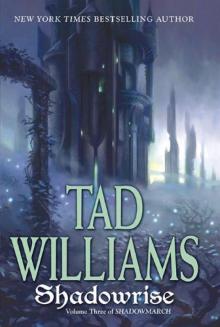 Shadowrise
Shadowrise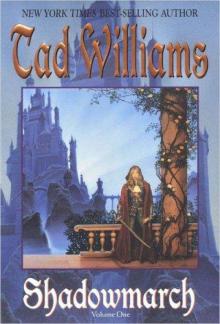 Shadowmarch
Shadowmarch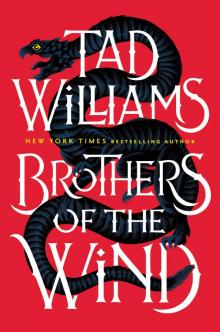 Brothers of the Wind
Brothers of the Wind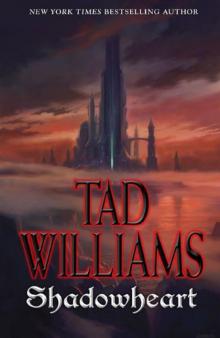 Shadowheart
Shadowheart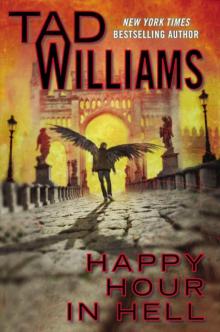 Bobby Dollar 02 - Happy Hour In Hell
Bobby Dollar 02 - Happy Hour In Hell The War of the Flowers
The War of the Flowers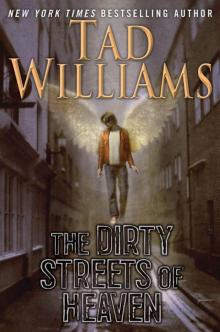 The Dirty Streets of Heaven bd-1
The Dirty Streets of Heaven bd-1 Tad Williams - The War of the Flowers (retail) (pdf)
Tad Williams - The War of the Flowers (retail) (pdf) Shadowheart s-4
Shadowheart s-4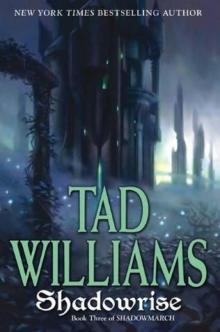 Shadowrise s-3
Shadowrise s-3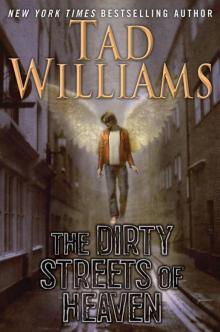 The Dirty Streets of Heaven: Volume One of Bobby Dollar
The Dirty Streets of Heaven: Volume One of Bobby Dollar The Stone of Farewell
The Stone of Farewell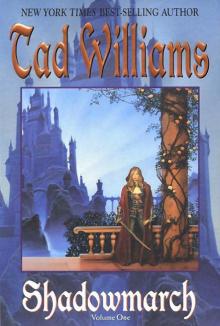 (Shadowmarch #1) Shadowmarch
(Shadowmarch #1) Shadowmarch The Secrets of Ordinary Farm of-2
The Secrets of Ordinary Farm of-2 Shadowmarch s-1
Shadowmarch s-1![Bobby Dollar [04] God Rest Ye Merry, Gentlepig Read online](http://i1.bookreadfree.com/i1/04/06/bobby_dollar_04_god_rest_ye_merry_gentlepig_preview.jpg) Bobby Dollar [04] God Rest Ye Merry, Gentlepig
Bobby Dollar [04] God Rest Ye Merry, Gentlepig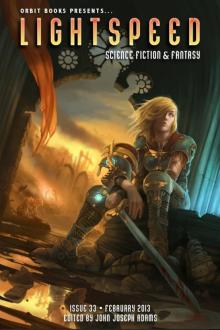 Lightspeed Issue 33
Lightspeed Issue 33 Sea of Silver Light o-4
Sea of Silver Light o-4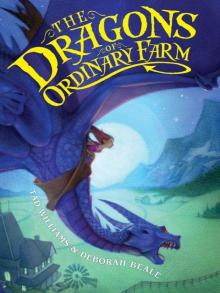 The Dragons of Ordinary Farm of-1
The Dragons of Ordinary Farm of-1 Shadowplay s-2
Shadowplay s-2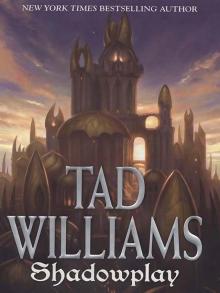 (Shadowmarch #2) Shadowplay
(Shadowmarch #2) Shadowplay